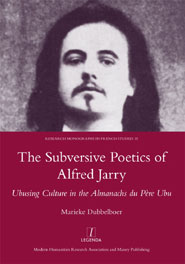The Subversive Poetics of Alfred Jarry: Ubusing Culture in the Almanachs du Père Ubu is a generously illustrated study which examines key characteristics of Jarry's poetics through an analysis of the Almanacs and addresses their role within the European avant-garde.
Alfred Jarry (1873-1907) is known primarily as the eccentric author of the Ubu plays and the creator of their outrageous hero Père Ubu. Indeed, anecdotes about Jarry’s bohemian lifestyle have largely overshadowed the merits of his writing. With the exception of his best-known play Ubu Roi (1896), his texts have tended to remain the preserve of a handful of scholars, amateurs and artists.
Jarry made his literary debut at the height of the Symbolist movement and was a contemporary of writers such as Gide, Valéry and Proust, but his work has never lent itself to being easily classified amongst that of contemporary writers or literary movements. Jarry’s literary career was made problematic partly by the non-conformity of his writing and partly by his own often provocative and difficult behaviour.
Posthumously, Jarry has nevertheless been hailed by many of his admirers as the embodiment of avant-garde experiment and artistic innovation. His work has often been compared to that of other singular authors such as Lautréamont, and labelled as an influence on a new generation of twentieth-century writers and artists, including Apollinaire or Picasso, and avant-garde movements, such as Dada or Surrealism.
Ubu’s Almanacs appeared at a turning point in Jarry’s oeuvre. The poetics expressed in these two works seem to represent a departure from the Symbolism of his earlier works and a transition to a more singular and more ‘modern’ aesthetic, possessing many of the features that have made Jarry’s work so influential.
Inspired by aspects of the artistic-counterculture found in the cabarets of Montmartre and by popular tradition, Ubu’s Almanacs hover between journalism, literature, popular culture and artistic counterculture. Jarry's groundbreaking use of collage in these early works, his absurdist humour and his rethinking of literary authorship and artistic originality foreshadow many innovations of twentieth-century art and literature, such as Braque and Picasso’s ‘papiers collés’ and the work of writers surrounding these painters, such as Apollinaire.
Jarry’s pioneering role in the twentieth century avant-garde is especially palpable in the two Almanacs. Apart from affirming Ubu’s status as a provocative, literary archetype, the two works incorporate innovative techniques and strategies that constitute the most radical aspects of Jarry’s writing.
The Subversive Poetics of Alfred Jarry: Ubusing Culture in the Almanachs du Père Ubu by Marieke Dubbelboer is published by Legenda.
